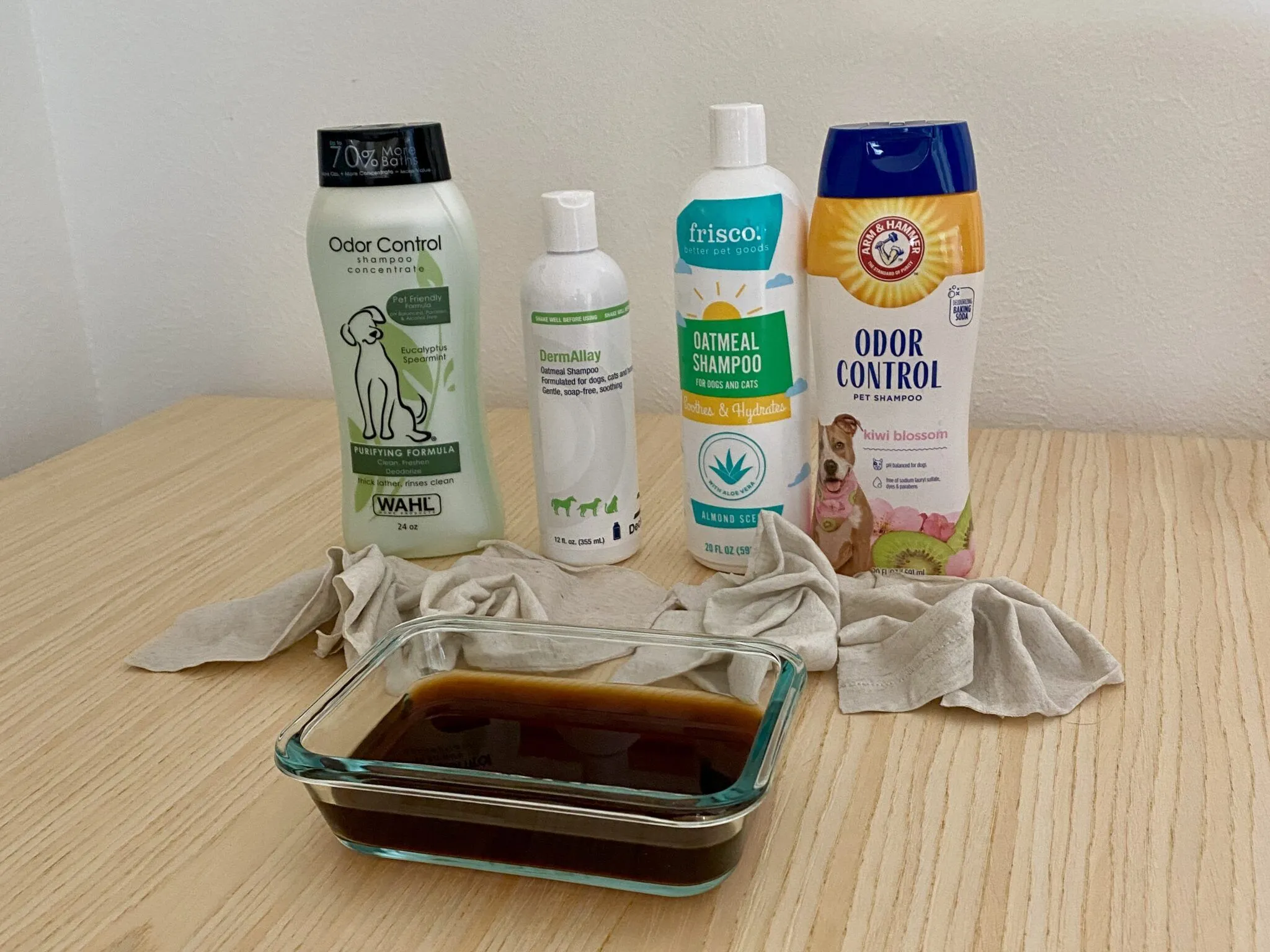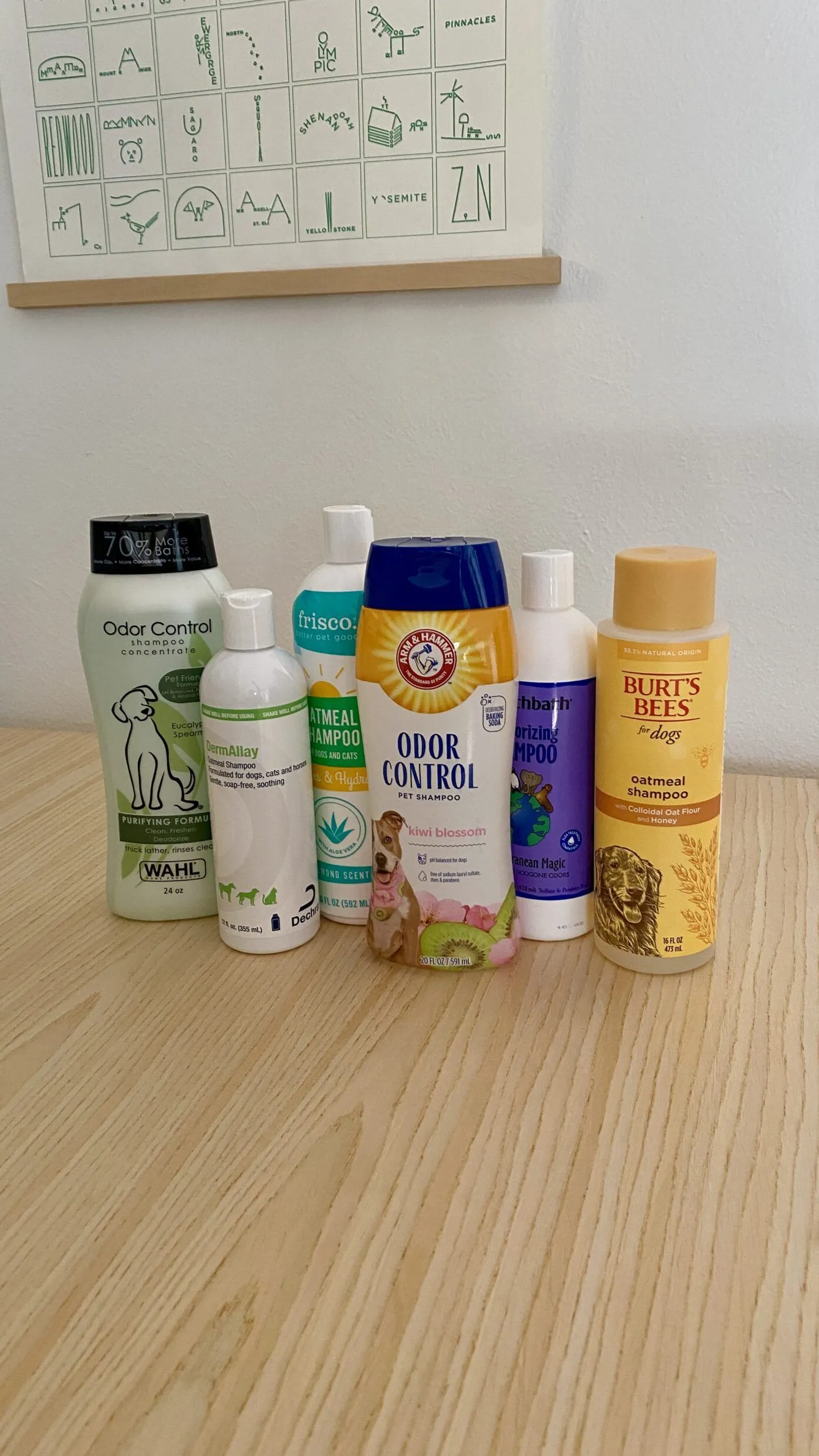Even the most beloved canine companions can sometimes develop an unpleasant odor, turning cuddle time into a less appealing experience. From rolling in something unsavory outdoors to underlying health issues, a variety of factors can contribute to your dog’s distinctive “doggy smell.” Finding the Best Dog Shampoo For Smelly Dogs is crucial for maintaining both your pet’s hygiene and your home’s freshness. This comprehensive guide reviews top-performing shampoos designed to neutralize odors and promote a healthy coat, helping you choose the perfect product for your stinky pup.
Why Your Dog Might Smell Bad
A lingering stench on your furry friend can be more than just a nuisance; it can sometimes indicate underlying issues. Understanding the common causes of dog odor can help you address the problem effectively.
One of the simplest reasons for a smelly dog is simply being overdue for a bath. Over time, natural oils, dirt, and debris accumulate on your dog’s coat and skin, leading to a greasy feeling and a more pronounced “doggy odor.” Dogs who enjoy exploring the outdoors, especially those who love rolling in dirt, grass, or even worse, animal waste, will inevitably pick up environmental smells that can be quite offensive.
However, if your dog consistently smells bad even after regular bathing, or if they are frequently licking and scratching themselves, it might be a sign of a health-related problem. Various skin conditions, ear infections, issues with anal glands, and allergies can all contribute to a smellier-than-usual pup. These conditions can cause excessive oil production, yeast or bacterial overgrowth, or inflammation that leads to a distinct, often unpleasant, odor. If you suspect a health issue is causing your dog’s bad smell, it’s always best to consult with your veterinarian for proper diagnosis and treatment.
Key Features to Look for in a Deodorizing Dog Shampoo
When searching for the best dog shampoo for smelly dogs, it’s important to select a product that not only cleans but actively neutralizes odors without irritating your dog’s skin. Here are the essential traits to consider:
Deodorizing Ingredients
The primary goal of a deodorizing shampoo is to tackle the odor at its source, rather than merely masking it with strong perfumes. Look for shampoos that incorporate ingredients known for their odor-neutralizing properties. Natural components like rosemary oil and baking soda are excellent for breaking down odor-causing molecules and leaving a fresh scent. Additionally, opting for a pH-balanced dog shampoo is highly recommended. Dogs have a different skin pH than humans, and using a shampoo designed for their specific needs helps maintain a healthy skin barrier, making them less susceptible to skin issues that can lead to unpleasant odors.
Skin-Friendly Ingredients
Many dogs, especially those prone to odors, may also have sensitive skin, allergies, or existing dermatological conditions. For these pups, soothing and moisturizing ingredients are paramount. Colloidal oatmeal is a widely recognized ingredient for its ability to calm irritated skin, reduce itchiness, and support the skin’s natural barrier. Ceramides are lipids that help restore and maintain the skin’s moisture, preventing dryness and flakiness. Aloe vera is another fantastic ingredient known for its anti-inflammatory and hydrating properties, providing relief and comfort for sensitive skin. Choosing a shampoo with these ingredients can help prevent skin irritation that might exacerbate odor issues.
 A person's hand washing a coffee-soaked rag with dog shampoo in a sink.
A person's hand washing a coffee-soaked rag with dog shampoo in a sink.
How We Tested Dog Shampoos for Odor
To identify the best dog shampoo for smelly dogs, a rigorous testing process was employed, combining real-life application with a standardized odor-neutralization test. The shampoos were evaluated on two different dogs: one a long-haired, double-coated breed and the other a short-haired, single-coated dog. This allowed for an assessment of how each shampoo performed across various coat types, considering factors like lathering ability, post-bath coat feel, and overall effectiveness in eliminating doggy odor. Shampoos that left residue or made the dogs’ coats feel dry were noted and penalized.
To specifically measure the odor-reducing capabilities, a controlled experiment was conducted. Rags were soaked in coffee for five minutes, simulating both dirt and a strong, pervasive odor. After a brief rinse, each rag was washed with half a teaspoon of shampoo and water for one minute, ensuring thorough lathering and scrubbing. The rags were then rinsed meticulously and left to dry overnight. Finally, each rag was smelled and ranked from least to most coffee scent. The results from this standardized test consistently aligned with the real-life applications on the dogs, providing a reliable indicator of each shampoo’s deodorizing power.
Top Picks: Best Dog Shampoos for Smelly Dogs
Based on our thorough testing, here are the top dog shampoos that excel at odor control, catering to different needs and budgets.
Best Overall: Wahl Odor Control Purifying Dog Shampoo
The Wahl Odor Control Purifying Dog Shampoo emerged as the top performer in our tests for neutralizing stubborn dog odors. This shampoo completely eliminated the coffee scent in the fabric test and left a pleasant, subtle minty aroma. When used on our tester dogs, it proved highly effective at cutting through excess oil and eradicating all doggy smells, including the persistent “Frito foot” odor common in older dogs.
While the eucalyptus spearmint scent in the bottle is quite strong, the residual scent on the dog after bathing is remarkably mild and fresh. This is a significant advantage, as some deodorizing shampoos tend to leave an overpowering perfume-like scent that merely attempts to mask the underlying odor. The Wahl shampoo truly purifies the coat.
For dogs with long or double coats, it is advisable to follow up with a conditioner, as this shampoo can leave the coat feeling a bit dry. It acts more as a clarifying shampoo, effectively stripping away oils, dirt, and product buildup from the skin and coat. For dogs prone to oily coats, this cleansing action is a benefit. At approximately $10 for 24 ounces, it offers excellent value for its performance.
Best for Allergies and Itchy, Sensitive Skin: DermAllay Oatmeal Shampoo
For dogs with sensitive skin, allergies, or chronic itchiness, the DermAllay Oatmeal Shampoo stands out as the premier choice. Its soap-free formula is exceptionally gentle, ensuring it won’t strip natural oils from dogs prone to dry skin. A key ingredient in this shampoo is colloidal oatmeal, a well-known remedy for various skin conditions, including eczema, severe dryness, and allergies in both humans and animals.
Dr. Sara Bledsoe, a veterinarian at Chewy, highlights that “The active ingredient in this therapeutic shampoo is a ceramide complex that helps rebuild and maintain a strong, healthy skin barrier.” This makes it particularly beneficial for dogs with compromised coats and sensitive skin.
Despite its gentle formulation, this shampoo is surprisingly effective at combating odor. It performed nearly as well as the Wahl shampoo in both the fabric and real-life dog tests, effectively breaking down odors. It left the long-coated tester dog’s fur feeling well-moisturized, even without a conditioner, thanks to its fatty acids and ceramides. At $17 for 12 ounces, it is pricier, but its specialized formulation for sensitive skin justifies the cost for owners dealing with specific dermatological concerns.
 A selection of four dog shampoo bottles standing on a white surface, with three blurry shampoo bottles in the background.
A selection of four dog shampoo bottles standing on a white surface, with three blurry shampoo bottles in the background.
Best Budget Option: Arm & Hammer Super Deodorizing Dog Shampoo
For dog owners seeking an effective deodorizing shampoo without breaking the bank, the Arm & Hammer Super Deodorizing Dog Shampoo is an excellent budget-friendly choice, typically priced under $10. This shampoo is notably sudsy and has a strong, artificial kiwi blossom scent that some might find overpowering. In our tests, it did leave a slight coffee smell on the fabric and some residue on the long-coated dog’s fur despite thorough rinsing.
However, for its price point, it delivered decent deodorizing results in both the coffee test and on the dogs, leaving only a bit of lingering scent. While it may not be the absolute best performer compared to premium options, it effectively tackles common doggy odors and is a solid choice for budget-conscious owners who need a reliable solution.
Another Excellent Choice: Frisco Oatmeal Dog & Cat Shampoo
The Frisco Oatmeal Dog & Cat Shampoo also demonstrated strong performance in our odor tests, successfully neutralizing both persistent doggy odors and the coffee scent. Although it has a strong, artificial almond scent in the bottle, it rinses out to a pleasant, slightly sweet, and neutral smell on the coat. This shampoo left both tester dogs feeling more moisturized than the Wahl shampoo, making it an excellent option for dogs with dry coats.
Dr. Katy Nelson, a senior veterinarian at Chewy, recommends this shampoo, stating, “For my own dog when he’s just plain dirty or stinky, I break out the Frisco Oatmeal Shampoo. It smells delicious, is gentle on his sensitive skin, and leaves his hair soft and tangle free. It’s a good one!”
While it is pricier than some other options, if you are looking for a shampoo that provides a deep clean like the Wahl but also offers the moisturizing benefits closer to the DermAllay, without needing the therapeutic strength of the latter, the Frisco Oatmeal Dog & Cat Shampoo is a highly commendable choice.
Other Shampoos We Also Tested
In our quest for the best dog shampoo for smelly dogs, we also evaluated Earthbath Deodorizing Rosemary Shampoo and Burt’s Bees Oatmeal, Oat Flour & Honey Shampoo. While both left our dogs’ coats feeling soft and clean, they were less effective at combating doggy odor compared to our top picks. In the coffee scent test, both shampoos left a noticeable coffee odor, indicating weaker deodorizing capabilities.
If your primary concern is eliminating strong odors, we recommend opting for the Wahl Odor Control Purifying Dog Shampoo, DermAllay Oatmeal Shampoo, Arm & Hammer Super Deodorizing Dog Shampoo, or Frisco Oatmeal Dog & Cat Shampoo, as these consistently performed better in neutralizing smells.
Conclusion
A smelly dog doesn’t have to be a permanent problem. With the right shampoo, you can effectively combat unpleasant odors and keep your beloved companion smelling fresh and clean. Whether you need an all-around powerful deodorizer like the Wahl Odor Control Purifying Dog Shampoo, a gentle formula for sensitive skin such as DermAllay Oatmeal Shampoo, or a budget-friendly option like Arm & Hammer Super Deodorizing Dog Shampoo, there’s a product out there to suit your dog’s specific needs. Always consider the root cause of the odor, and if you suspect an underlying health issue, consult your veterinarian. By choosing wisely, you can ensure a happier, fresher-smelling pup and more enjoyable cuddle times.
